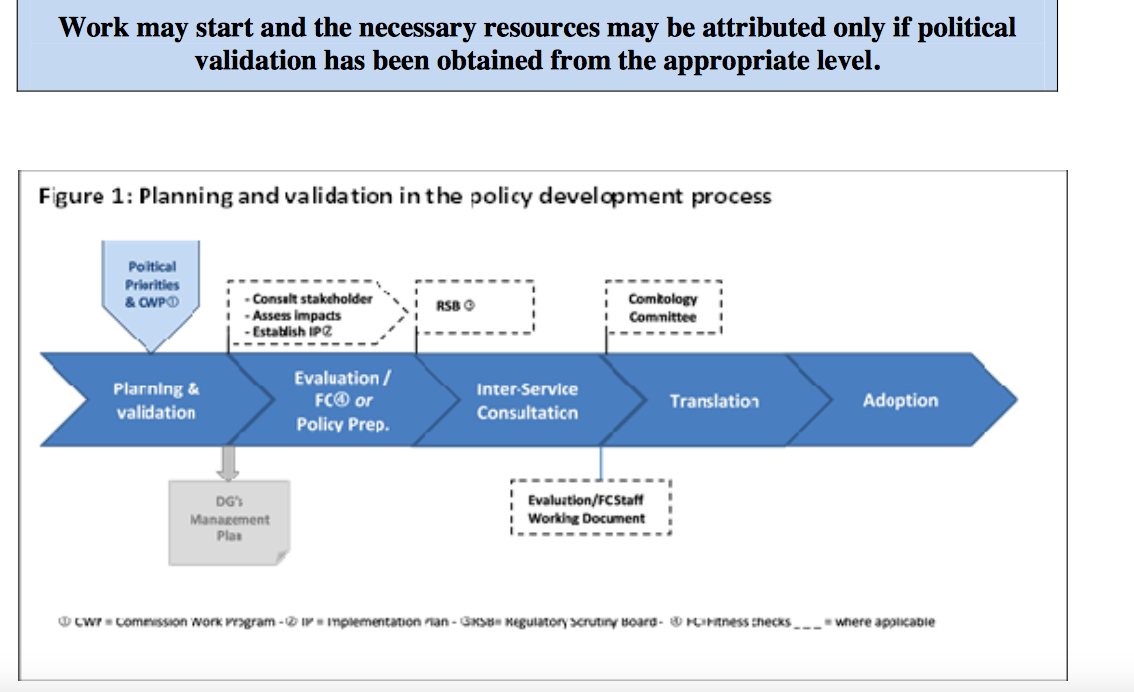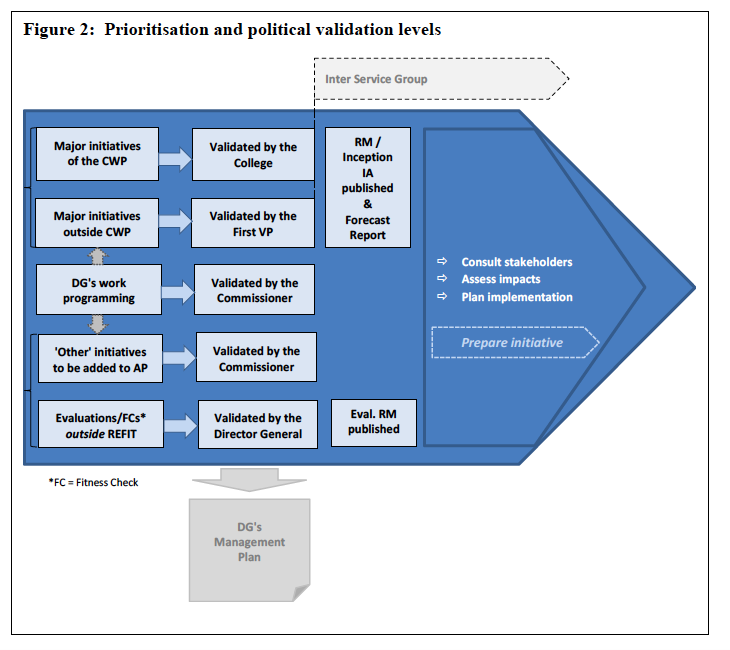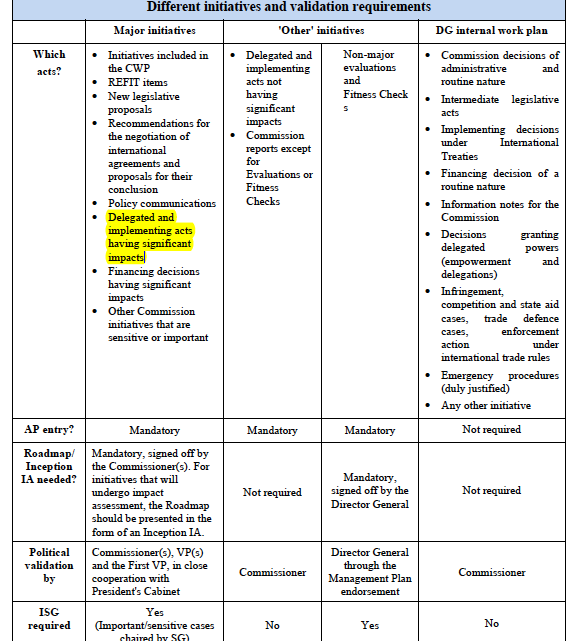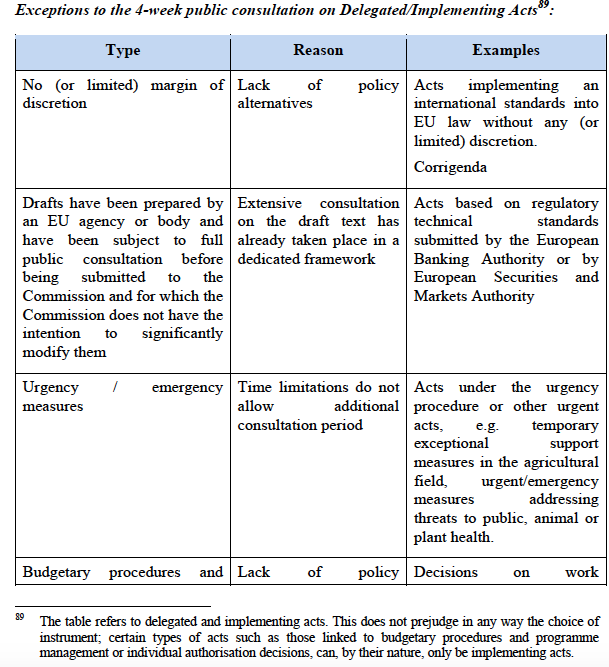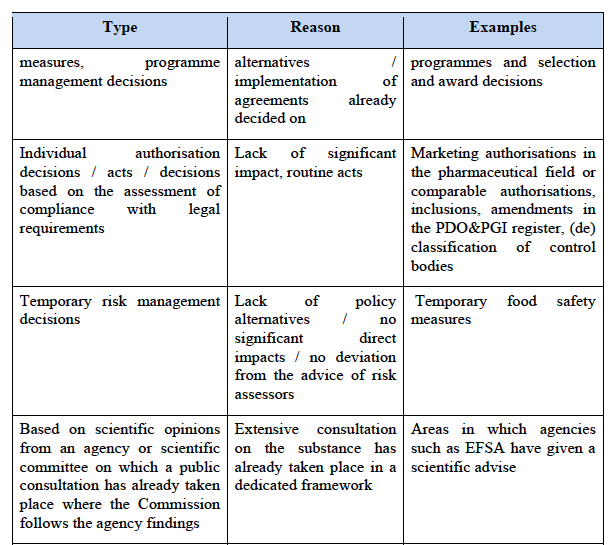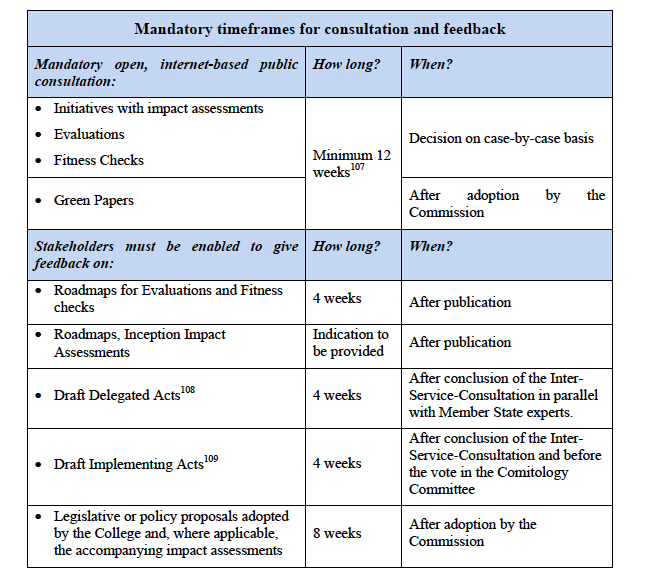Better Regulation and Delegated Legislation
On the expectation that few people (in or outside the Commission) read the rules about how the Commission operate and prepare laws ( and the same rules they fortunately publish), I wanted to provide a brief summary of how the new Commission Better Regulation rules impact delegated legislation.
The Commission has two sets of commitments on Better Regulation that need to be read in conjunction with each other. First, there is the Inter-Institutional Agreement, and second there are the Commission’s self commitments are laid out in two documents:
These commitments will apply in addition to the Inter-Institutional Agreement. I have written on some of those changes on the Agreement here.
The self commitments are worth reading as an unusual example of clear and coherent drafting from the Commission services. One can only hope that lucidity of the Guidelines and the Toolbox are such that Commission officials can not say they did understand the new rules, and use ignorance as a reason for not applying thm.
Taken together, the new rules will, if the Commission can apply them on the Services, be positive for open and better law making overall. And, for delegated legislation they will be a radical and welcome move to bring the EU into the sunshine of the 21st century.
Reason for these changes
They have come about for two main reasons.
First, Vice-President Timmermans made explicit personal commitments to overhaul the Commission’s delegated law making process in his confirmation hearings.
Second, as ENDS reported on 21 March 2016, it is a by-product of the EU-US talks under TTIP. The US system of law making is more transparent than the EU system, and the EU have opted to drag the EU system into the light of the 21st century.
The challenge will be for the Commission Services to respect these guidelines. After so long drafting and passing delegated legislation with little or no political oversight from the Commissioners, their Cabinets, or the Secretary-General policing the guidelines, it will be hard to break old habits. As I have written before European Parliament and Member State scrutiny is at times theoretical, and the public seem to be a bystander to be ignored.
Policing
The Secretary-General and the Cabinet of V-P Timmerman’s will be left to police these new rules. I suspect that they will be kept busy for the first 12-18 months as they break in colleagues in the Services.
Why these changes are helpful
It is a strange constant at how often important delegated legislative measures are pushed by some Commission Services without any consideration of President Juncker’s Political Guidelines or the Commission’s internal guidelines. I have been surprised to discover some Services are unaware that some delegated legislation need Impact Assessments, or that Road Maps are needed for measures for political validation rom the Commissioner. It helps explain why sometimes important draft delegated legislative proposals do not even exist in the Commission’s internal database that is mean to track all legislative work. For the latter, I guess it is hard to ask questions about a proposal in inter-service consultation if it officially the draft delegated measure does not exist.
Key provisions
The self commitments are helpful in that clarifies the rules for (1) political validation, (2) public scrutiny, (3) and the use of impact assessments, and (4) road maps for delegated implementing acts.
Road Maps and Validation
For the lack of reference, the Guidelines are worth citing in full.
Box 2. Scoping, political validation and inter service work (See Page 8)
- Major initiatives must be accompanied by a Roadmap and entered into Agenda Planning as soon as preparatory work starts – at least 12 months prior to adoption by the College. They must be validated by the lead Commissioner, relevant Vice- President and the First Vice-President before being accepted to be included into the Commissions’ planning. The political validation must be understood as giving the green light to proceed with further preparatory work. It should not be interpreted as a decision on a particular initiative or course of action that prejudges the outcome of any impact assessment process, stakeholder consultation or later political discussion in the College.
- Roadmaps explain what the Commission is considering. A Roadmap describes the problem to be tackled and the objectives to be achieved. It sets out why EU action may be needed and its value added. The policy options being considered are outlined. The Roadmap also justifies the absence of an impact assessment. It also announces the details of the stakeholder consultation strategy (see later chapter). A (different) Roadmap is also prepared for each evaluation and Fitness Check. This specifies the scope of the evaluation and presents the evaluation questions to be answered.
- An Inception Impact Assessment is a Roadmap for initiatives subject to an IA that sets out in greater detail the description of the problem, issues related to subsidiarity, the policy objectives and options as well as the likely impacts of each option.
- All Roadmaps and Inception Impact Assessments are published by the Secretariat General on the Commission’s website8 so that stakeholders are informed and can provide initial feedback (including data and information they may possess) on all aspects of the intended initiative and impact assessment.”
Evaluations, impact assessments, stakeholder consultations, policy proposals and implementation plans must be prepared collectively by the services9 within an interservice group. It is important that all services with an interest participate actively in the interservice work from the outset, particularly those DGs with specific expertise (e.g. competitiveness, SME impacts, social impacts, environmental impacts and scientific/analytical) (See Page 7 Guidelines).
Before Going Anywhere
The Guidelines (page 11) make clear that no work at all can continue unless:
Key requirements
- Work may only start and the necessary resources attributed if an initiative has received political validation at the appropriate level and a valid entry exists in Agenda Planning, where applicable (cf. point 3 below).
- “Major” new initiatives have to be accompanied by a Roadmap or Inception IA and require political validation from the lead Commissioner, Vice-President and First Vice President.
- A valid agenda planning entry is needed in order to launch an interservice consultation.
This graphic is helpful in explaining the steps (See Guidelines page 11)
See Page 12 Guidelines
See Guidelines page 13
Delegated Legislation is Covered
Let’s be clear, delegated legislation can be subject to “validation”, and if it “has significant impact” must be.
As the Guidelines state: ” All ‘major initiatives’ need to be entered into Agenda Planning at the latest 12 months before their planned adoption date and be accompanied by a Roadmap16 or an Inception Impact Assessment. The implementing instructions identify certain types of acts as being per definition ‘major’. However, any other Commission initiative that is sensitive or important should also be considered as ‘major’. It is the responsibility of each DG to consider carefully aspects such as the political importance and sensitivity, the magnitude of the expected impacts; importance for other policy areas and prior knowledge about divergent or sensitive stakeholder views (see Page 13 Guidelines)”.
And, in case there is any confusion, the Guidelines provide a clear chart to make clear that delegated legislation having significant impacts require validation, and the subsequent steps that such measures needed.
See: Page 14 Guidelines.
What happens if officials don’t comply with the rules?
The Guidelines helpfully spell out to Commission Services that if they don’t follow the new rules the draft proposal can be blocked:
“If preparatory work for a possibly important or sensitive initiative is carried out only at internal DG level and outside of Agenda Planning, the launch of the ISC may not be validated at political level, or the initiative may be blocked by any DG at the ISC stage, due to the lack of transparency and non-compliance with the implementing instructions.” (see Page 15 Guidelines) .
Public Consultation Timelines
The Commission will introduce on or around 1st July 2016 a public screening and consultation process for draft delegated and implementing acts. I presume that RPS measures will be included in this new database.
This means that for draft delegated and implementing acts the public will be given 4 weeks to provide feedback.
For draft delegated acts this means the 4 week public consultation will start “after conclusion of the Inter- Service-Consultation in parallel with Member State experts.
For drafting implementing acts this means the 4 weeks public consultation will commence “after conclusion of the Inter- Service-Consultation and before the vote in the Comitology Committee”.
This will give the Commission a final chance to check if they have overlooked an important first order impact, or second or third order impacts.
In addition, the Commission will publish a version of their Agenda Planning on the database that lists upcoming delegated legislative measures coming on stream.
Of course, there will be exceptions to the the need for publicity. The Guideless provide a table replicated below of those cases.
See Page 67-68 Guidelines.
Timing for consultation
The Guidelines provide a timetable for the standard public consultations.
See Page 77 Guidelines.
Toolbox
The Guidelines are accompanied by a more detailed Toolbox. This provides 59 tools for Commission Services to use in their work and complying with Better Regulation. There will be little margin for error given how clear and comprehensive these rules are.
The Toolbox provides some helpful clarification on a number of points.
The Commission leads will have to provide a justification on why a draft delegated measure does not have a major impact. At the moment, the Services just need to tick a book saying this is the case and provide no reason or reasoning why this is so. The Toolbox states “DGs should not start work without having political validation by the responsible Commissioner. At the latest 3 months before the planned adoption, the initiative has to be introduced in Agenda Planning. For delegated acts and implementing acts an appropriate justification why they do not have significant impacts and are thus ‘not major’ has to be provided.” (page 10 Toolbox).
In relation to risk management decisions, nuanced criteria may limit the application of some Impact Assessment rules.
swd_br_guidelines_en
br_toolbox_en
